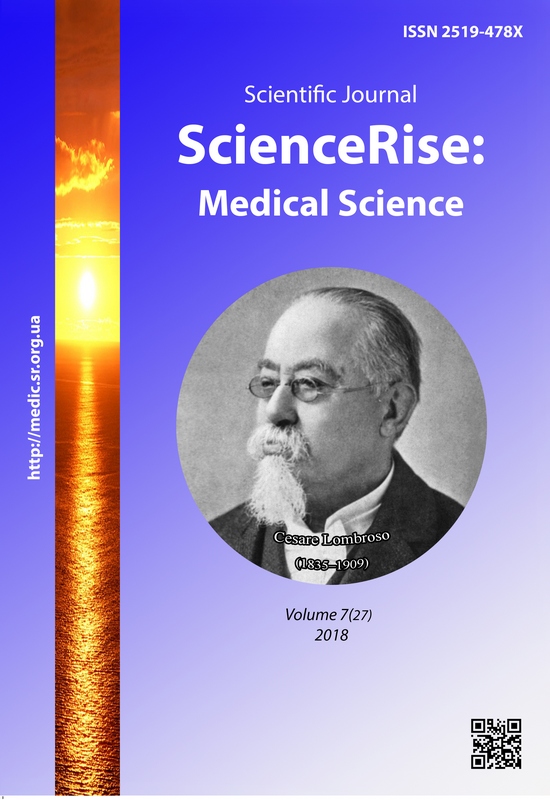Clinical-psychopathologic and pathophychological features of adaptation disorders in computer addicted individuals
DOI:
https://doi.org/10.15587/2519-4798.2018.149283Keywords:
adaptation disorders, computer addiction, anxiety, depression, psychological stress, astheniaAbstract
The aim. Comprehensive study of clinical, psychopathological and pathopsychological features of adaptation disorders in persons with computer addiction.
Materials and methods. 147 patients with adaptation disorders (F43.21, F43.22). The main group consisted of 85 patients with signs of computer addiction according to the results of AUDIT-like tests, the control group - 62 patients with no signs of addictive behavior. The average age of the patients was 27.0 ± 3.0 years.
Methods of the research: clinical and anamnestic; clinical-psychopathological, using AUDIT-like tests for a comprehensive assessment of addictive status (Linsky I.V., Minko A.I., Artemchuk A.P., et al., 2009); psycho-diagnostic using the hospital anxiety and depression scale (HADS) (Zigmond A.S., Snaith R.P., 1983); Clinical scales of anxiety and depression by Hamilton (M. Hamilton, 1967), adapted to ICD-10 (G. P. Panteleeva, 1988) (HDRS) scales of situational and personal anxiety by C. D. Spielberger (in adaptation by Yu. L. Khanin, 1981); enquirer of neuro-psychological stress by Nemchin T.A. (1984); statistical.
Results of the research. The structure of computer addiction in the main group of surveyed was as follows: intrusive surfing (46.2 %), computer games (22.3 %); virtual dating (6.4 %); passion for online gambling (13.7 %); cybersex (1.4 %).
Depression of mood dominates in the clinical picture of eradication adaptation in persons with computer addiction; internal stress with inability to relax; increased susceptibility to previously neutral stimuli; irritability; asthenic symptoms; loss of interest in work or school, family and friends; sleep-wake cycle disorders.
According to the psychodiagnostic examination data, the main group of examined showed clinical signs of anxiety and depression on a hospital scale; severe depressive and disturbing episodes on the Hamilton scale; high drop situational and personal anxiety according to the method of C. D. Spielberger, a high level of severity of neuropsychic stress on a scale T.A. Nemchin.
Conclusions. For the clinical picture of adaptation disorders in individuals with computer addiction, a characteristic is decreased mood background; irritability, tendency to affects; disturbing manifestations; hyperesthesia; sleep-wake cycle disorders; clinical manifestations of anxiety and depression on the HADS scale; severe depressive and disturbing episodes on the HDRS scale; high drop situational and personal anxiety; excessive mental stress
References
- Denisenko, M. M. (2017). Sotsialna frustrovanist v formuvanni adiktivnoyi povedinki pri nevrotichnih rozladah. Wschodnioeuropejskie Czasopismo Naukowe, 1 (9 (25)), 30–37.
- Aymedov, K. V. (2007). Klinicheskie aspektyi sovremennoy addiktologii (literaturnyiy obzor). Visnik psihiatriyi ta psihofarmakoterapiyi, 1 (11), 136–145.
- Kozhina, G. M., Krasnikova, S. O., Gaychuk, L. M., Zelenska, K. O. (2011). Spetsifika adaptatsiynih reaktsiy studentiv pershogo kursu do navchalnoyi diyalnosti u vischomu navchalnomu zakladi. Medichna psihologiya, 6 (3 (23)), 14–17.
- Terasaki, D. J., Gelaye, B., Berhane, Y., Williams, M. A. (2009). Anger expression, violent behavior, and symptoms of depression among male college students in Ethiopia. BMC Public Health, 9 (1). doi: http://doi.org/10.1186/1471-2458-9-13
- Maruta, N. O., Kolyadko, S. P., Kalenska, G. Yu., Denisenko, M. M. (2016). Addiktivnyiy status i veduschie strategii sovladaniya u bolnyih s nevroticheskimi rasstroystvami i lits obschey populyatsii: sravnitelnyiy aspekt. Psihiatriya, psihoterapiya i klinicheskaya psihologiya, 7 (4), 501–511.
- Kozhina, G. M., Korostiy, V. I. (2014). Komorbidnist nehimichnih addiktsiy ta psihosomatichnih zahvoryuvan. Dovzhenkivski chitannya: «Problema prihilnosti hvorih narkologichnogo profilyu do terapiyi. Potreba v likuvanni ilikuvannya za potreboyu». Kharkiv, 85–95.
- Revenok, O. A., Aymedov, K. V., Koroshnichenko, D. M. (2011). Adiktivna komorbidnist u suchasniy narkologichniy praktitsi. Arhiv psihiatriyi, 17 (2 (65)), 92–95.
- Maruta, N. A. (2013). Problema komorbidnosti v sovremennoy psihiatrii. Teoreticheskiy, klinicheskiy, terapevticheskiy i organizatsionnyie aspektyi. Zdorov’ya Ukrayini, 12, 38–39.
- Osuhovskaya, E. S. (2012). Adaptatsionnyie rasstroystva u muzhchin i zhenschin, stradayuschih patologicheskoy sklonnostyu k azartnyim igram. Psihіchne zdorov’ya, 1, 76–81.
- Sartorius, N., Holt, R. I. G., Maj, M. (Eds.) (2015). Comorbidity of Mental and Physical Disorders. Key Issuesin Mental Health. Basel: Karger, 179, 188. doi: http://doi.org/10.1159/000366509
- Melnik, V. O. (2011). Analiz suchasnogo stanu psihichnih ta povedinkovih rozladIv, pov’yazanih z patologichnim vikoristannyam komp’yuteru ta Internet-merezhi. Psihichne zdorov’ya, 1 (30), 22–25.
- Tabachnikov, S. I., Harchenko, E. M., Prib, G. A. (2010). Psihologichni osoblivosti osib iz zalezhnistyu vid azartnih igor. Arhiv psihiatriyi, 16 (4 (63)), 39–43.
- Osuhovska, O. S., Aymedov, K. V. (2010). Doslidzhennya rozpovsyudzhenosti ta osoblivostey zalezhnosti vid azartnih igor yak formi nehimichnoyi adiktsiyi sered gromadyan Ukrayini. Arhiv psihiatriyi, 1 (60), 58–63.
- Denisenko M.M. (2016). Osoblivosti ta varianti spivvidnoshennya riznih adiktivnih tendentsiy u hvorih na nevrotichni rozladi. Eksperimentalna i klinichna meditsina, 3 (72), 99–107.
Downloads
Published
How to Cite
Issue
Section
License
Copyright (c) 2018 Yuliia Starodubtseva

This work is licensed under a Creative Commons Attribution 4.0 International License.
Our journal abides by the Creative Commons CC BY copyright rights and permissions for open access journals.
Authors, who are published in this journal, agree to the following conditions:
1. The authors reserve the right to authorship of the work and pass the first publication right of this work to the journal under the terms of a Creative Commons CC BY, which allows others to freely distribute the published research with the obligatory reference to the authors of the original work and the first publication of the work in this journal.
2. The authors have the right to conclude separate supplement agreements that relate to non-exclusive work distribution in the form in which it has been published by the journal (for example, to upload the work to the online storage of the journal or publish it as part of a monograph), provided that the reference to the first publication of the work in this journal is included.









